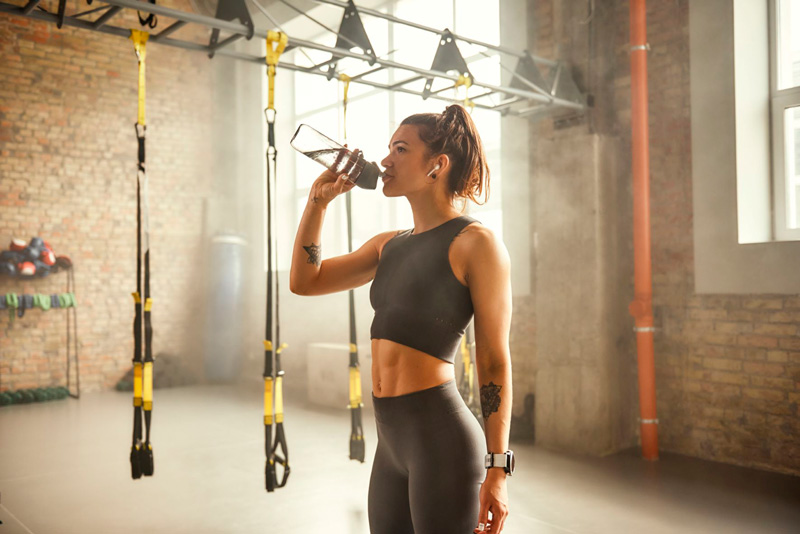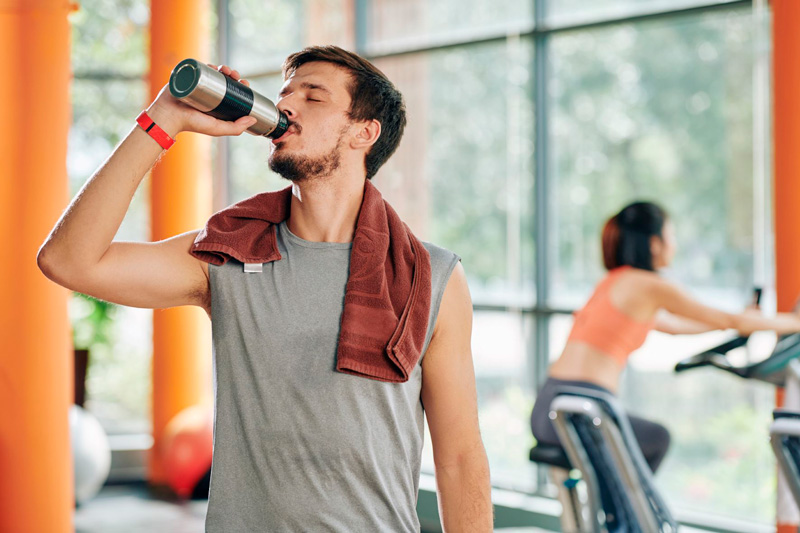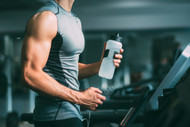Athletic Hydration
Posted by Joel Pelina on May 10th 2022
Hydration is essential to good health. Every doctor and every nutritionist will tell you that. Proper hydration profoundly affects the way your body operates, looks, and feels. Hydration affects your metabolism, your mental focus, your body temperature, your skin and hair, and your muscles. Hydration is even more important when you exercise, whether for health, for fun, and/or for sports and competition. Your health demands proper athletic hydration.
General Hydration Guideline
So how much water should people drink? Years ago, common sense guidelines stated that 8, 8-oz glasses of water a day was enough to stay properly hydrated. More recent, more accurate guidelines recommend you drink half your body weight in ounces of water a day, so someone weighing 160 pounds should drink 80-oz of water each day, or 10, 8-oz glasses.
But exercise and athletic efforts necessitate increased hydration. When you exercise, you sweat, as your body works to cool down your temperature from your effort. By losing hydration, you’re not only reducing the ability for your body to sweat more, but also inhibiting your body’s efforts to transport oxygen and nutrients to your muscles, and transport waste chemicals and carbon dioxide away from your muscles. Athletic effort without hydration means losing focus, becoming more tired, increasing the chance of muscle cramps, or even causing dizziness or heat stroke.
Measuring Hydration Loss
Did you know you can actually measure how much fluid you lose during exercise? Weigh yourself before exercise or athletic activity, and then weigh yourself afterwards. Every pound of difference in weight loss is roughly equivalent to 16 to 24-oz of water lost. That’s why quickly lost pounds from exercise is often called losing “water weight,” because that is the primary source of body weight initially lost due to exercise.
So, if you find yourself about 2 pounds lighter after a hard worker, it actually means you lost at least 32-oz of body fluid. If you are supposed to drink 10, 8-oz glasses of water on a normal day, you now have to add on a minimum of 4 more 8-oz glasses of water in hydration.

Hydrating Before, During, and After Exercise
Because of this, the American Council on Exercise suggests that you drink water before, during, and after exercise. Starting up to three hours before you exercise, you should drink 17 to 20-oz of water. Drink another 8-oz of water during your warmup, and another 7 to 10-oz of water every half hour of physical effort. Once you finish, drink another 8-oz of water.
What About Sports Drinks?
Sports drinks actually do serve a function for athletics. They provide hydration coupled with electrolytes such as sodium and potassium that help balance and regulate the fluids in your body, affecting the pH levels of your blood (acidity or alkalinity), the contraction of your muscles, and the operation of your nervous system. When you sweat, you lose sodium along with water – this is why sweat is salty. When your electrolyte levels are low, you can feel fatigue, headache, nausea, or muscle cramps.
But, while sports drinks can help replenish your electrolytes, they also tend to include high amounts of added sugars or even caffeine. Unlike natural sugars found in fruits, vegetables, or dairy, added sugars tend to be nothing more than “empty calories” designed to make the drink sweeter but offering little nutritional value. Caffeine itself is a diuretic, which means that it can offset any hydration benefits by increasing the frequency of your urination.

The typical sports drink contains water, carbohydrates, electrolytes, and sometimes amino acids.
- Water: The base fluid of a sports drink, offering pure hydration.
- Carbohydrates: In the form of sugar or a glucose derivative to provide fuel for your body.
- Electrolytes: In the form of sodium, potassium, or magnesium, these help maintain the fluid balance in your body and the operation of electrochemical processes in your cells and organs.
- Amino acids: When present, they are used to promote muscle recovery.
At first glance, it appears as a list of all beneficial ingredients. But the issue with sports drinks is that they are designed to be optimal for intense physical activity, as generally experienced by professional, semi-professional, or amateur athletes. Sports drinks are designed for extreme physical activity in relatively short periods of time, where the strenuous muscle activity can benefit from the added carbohydrates, electrolytes, and amino acids to promote maintenance and prevent cramps or spasms. For the average person jogging or hiking on a sunny day, the added ingredients in sports drinks instead become additional calories and minerals with a much lower necessity or effect on the body. For many sports drinks, the excessive amount of added sugar increases the caloric intake to the point it offsets the benefits of casual exercise activity.
Energy Drinks and Hydration
Energy drinks are specialized beverages not promoted for hydration benefits, but instead for their purported ability to boost energy and alertness. They do this through the addition of high amounts of sugar, caffeine, and additional chemical additives such as guarana or taurine.
- Sugar: In energy drinks, sugar provides a quick, intense burst of energy that can rapidly fade and cause fatigue, resulting in what is generally called a “sugar crash.” It also adds a vast amount of calories to the drink.
- Caffeine: Promotes increased alertness and concentration, although excessive amounts of caffeine can also cause nervousness or jitters. Caffeine has a diuretic effect, and therefore can be a cause of dehydration.
- Added chemicals: Energy drinks can greatly vary in their chemical additives, with varying effects. Guarana is commonly used as an additional source of caffeine. Taurine is an amino acid that works as an antioxidant, but whose effects in energy drinks are debatable. B vitamins are often added to promote the conversion of carbohydrates into energy.
While energy drinks can promote increased energy or alertness, due to the effects of sugar and caffeine, hydration is not a factor when it comes to their composition, and the high levels of caffeine can dehydrate through an increased need for urination.
Water and Hydration
Water is synonymous with hydration. It is an essential body element, and used throughout the body for proper maintenance and operation. As such, when it comes to being active, water is a quick and easy way to rehydrate, with no additives or additional calories. Multipure water is an even better option, as it provides water that is treated for a broad array of potentially harmful contaminants, improving its taste, appearance, and healthfulness.
Cost Comparison
- Sports drink: $1.40 per liter, equal to $5.31 per gallon
- Energy drink: $2.00 per 16 oz, equal to $16 per gallon
- Multipure water: $90 per 750 gallons, equal to $0.12 per gallon
When it comes to hydration and active lifestyles, water offers the best hydration at the best price. It is affordable, available at your kitchen sink, portable with a reusable water bottle, and free from unnecessary additives. While energy drinks may promote increased concentration, alertness, and energy, they come at a very high monetary cost (13,333% higher than Multipure water) and with no consideration for actual hydration. Sports drinks offer additives that can be beneficial for high levels of athletic performance, but can be unnecessary or excessive for non-athletes; at a price that is 4,425% higher than Multipure water, its cost does not justify its benefits. When it comes to exercise and general physical activity, Multipure remains the best option for healthy hydration. For Life. For You.
Multipure Means Better Athletic Hydration
Aside from the fact that water offers hydration without added sugars or other unnecessary additives, the best reasons to use Multipure filtered water for athletics come down to health, cost, and convenience. Multipure offers cleaner, healthier water, free from potentially harmful contaminants – especially microplastics, which plastic bottles are known to add to their contents. At just $0.12 per gallon, Multipure filtered water is vastly more cost-conscious than sports drinks or other beverages, which tend to start at $1.50 for a 20-oz bottle, equivalent to $9.60 a gallon. And with availability right at your kitchen sink, and portability with a reusable water bottle, Multipure is convenient because is it available when you need it – not just for athletic hydration, but also for washing fruits and vegetables, and for cooking. Multipure offers the cleaner, healthier water your body needs. For Life. For You.
References
- “Exercise – the low-down on hydration.” Better Health Channel. December 5, 2018. https://www.betterhealth.vic.gov.au/health/healthyliving/Exercise-the-low-down-on-water-and-drinks
- "Hydration for Athletes.” familydoctor.org. August 13, 2020. https://familydoctor.org/athletes-the-importance-of-good-hydration/
- Zelman, Kathleen. “Drink Up for Sports and Fitness.” WebMD. Last accessed May 6, 2022. https://www.webmd.com/fitness-exercise/features/drink-up-sports-fitness

